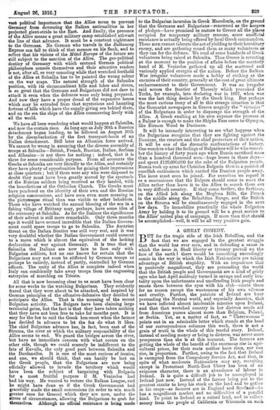THE SITUATION IN THE BALKANS. T HE great question of Salonika
is about to be brought to the test. Before long we shall have clear evidence whether it was right or wrong to go to Salonika, and we have little doubt ourselves that it will be proved that the decision was wise. We know all that can be said about the dispersion of energy and the folly of a policy of petits paquets, but we believe that the Salonika adventure will turn out in its broad results to be a grand paguet. In any case, there must have been a majority in favour of the plan in the Council of the Allies, and that really settles the question. The military unity of the Allies is so tremendously valuable in its broad workings that even if in the process of attain- ing it errors had to be accepted—certain parties to the Alliance very clearly perceiving them to be errors—the unity would still be worth buying at the price a thousand times over. But as we have said, we do not believe that an error has been committed. The presence of the Allies at Salonika has obviously saved Greece from the fatal direction of wrong- headed leaders. It has saved the course of Balkan affairs from all the repercussions of a false act by Greece. It has prevented the Germans from descending upon Salonika and establishing a submarine base there. It is a visible pledge of vast political importance that the Allies mean. to prevent Germany from devouring the Balkan nationalities in her projected giant-stride to the East. And finally, the presence of the Allies means a great military camp established athwart the line of that advance. It must be a constant nightmare to the Germans. No German who travels in the Balkanzug Express can fail to think of that menace on his flank, and to reflect that his visions of the Mittel Europa of the future are still subject to the sanction of the Allies. The geo-pohtral destiny of Germany with which orotund German political philosophers console themselves and their attentive readers Is not, after all, so very consoling while that wretched foothold of the Allies at Salonika has to be painted the wrong colour on the war maps. The natural strength of the Salonika position, with its eircumambient hills and lakes and rivers, Is so great that the Germans and Bulgarians did not dare to attack it even when the defences were only being prepared. And now they have a proper dread of the expansive forces which may be extruded from that mysterious and haunting fortress of hills which have the supply-giving sea behind them, and on the sea the ships of the Allies commercing freely with all the world.
We have all been wondering what would happen at Salonika, and now the curtain rises. As long ago as July 30th a Russian detachment began landing, to be followed on August 10th by the disembarkation of the first transport-loads of an Italian detachment. Still later an Albanian force arrived. We cannot be wrong in assuming that the diverse assembly of troops at Salonika—British, French, Russian, Italian, Serbian and Albanian—is not there for nothing ; indeed, that it is there for some considerable purpose. From all accounts the Greeks at Salonika are very friendly to the Allies, and certainly they have plenty of opportunities for gaining their impressions at close quarters ; but if there were any who were disposed to doubt they must have been greatly moved by the spectacle of the Russian soldiers being received as they landed, with the benedictions of the Orthodox Church. The Greeks must have pondered on the identity of their own and the Russian religious communions, and have seen even more meaning in the picturesque ritual than was visible to other beholders. Those who have watched the annual blessing of the sea in a flaking village of Brittany may, perhaps, have some idea of the ceremony at Salonika. As for the Italians the significance of their advent is still more remarkable. Only three months ego it would have seemed incredible that the Italian Govern- ment could spare troops to go to Salonika. The Austrian threat on the Italian frontier was still very real, and it was very doubtful whether the Italian Government could consent to a move which is almost the equivalent of the lacking declaration of war against Germany. It is true that at Salonika the Italians are now face to face only with Bulgarian soldiers, but no one knows for certain that the Bulgarians may not soon be stiffened by German troops or perhaps be entirely, instead of partly, controlled by German officers. The unity of the Allies is complete indeed when Italy can confidently take away troops from the engrossing enterprise of marching on Trieste.
All that is now becoming clear to us must have been clear for some weeks to the watching Bulgarians. They evidently feared that they were about to be attacked, and inspired by German principles of the offensive-defensive they decided to anticipate the Allies. That is the meaning of the recent Bulgarian activity. The Bulgars have been claiming large territorial gains, but the fact is that they have taken nothing that they have not been free to take for months past. It is easy for the fox to raid the Greek hen-roost when the farmer has decided in advance to let the fox do what it likes. The chief Bulgarian advance has, in fact, been east of the Strama, the river at which the military responsibility of the Allies seems to end. We guard the bridges across the river, but have no immediate concern with what occurs on the other side, though we could scarcely be indifferent to the fate of Kavalla, the only good port between Salonika and the Dardanelles. It is one of the most curious of ironies, and one, we should think, that can hardly be lost on the Greek people, that the Bulgarians are now being officially allowed to invade the territory which would have been the subject of bargaining with Bulgaria for a most fruitful purpose if M. Venizelos had had his way. He wanted to restore the Balkan League, and he might have done so if the Greek Government had gracefully made the small concessions (in order to win much greater ones for Greece) which they are now, under the stress of circumstances, allowing the Bulgarians to grab for themselves. Although no official resistance is being made to the Bulgarian incursion in Greek Macedonia, an the ground that the Germans and Bulgarians—renowned as the keepers of pledges—have promised to restore to Greece all the places occupied for temporary military reasons, some unofficial resistance is actually being offered by local Greek commanders. These men cannot tolerate the act of yielding to their hereditary enemy, and are gathering round them as many volunteers as they can for the defence. We read of some hundreds of Greek volunteers being raised at Salonika. Thus Greece is reverting at the moment to the position of affairs before the masterly hand of M. Venizelos gathered up all the scattered and variously applied energies of the nation. Before the Balkan War irregular volunteers made a hobby of striking at the enemies of their country, generally at the cost of great ultimate embarrassment to their Government. It was an irregular raid across the frontier of Thessaly which provoked the Turks, for example, into declaring war in 1897, when war was the last thing desired by the Greek king. But perhaps the most curious irony of all in this strange situation is that the Gounarist newspapers in Greece magnify the " victories " of the Bulgarians in order to disparage the strength of the Allies. A Greek exalting at his own expense the prowess of a Bulger is enough to make the Shipka Pass come to Olympus, like Birnam Wood to Dusinane.
It will be intensely interesting to see what happens when the Bulgarians recognize that they are fighting against the Russians, the creators and the chief protectors of their nation. It will be one of the dramatic confrontations of history. One wonders what the feelings of Bulgarians will be who rercem ber the history of forty years ago when Russia sacrificed more than a hundred thousand men—huge losses in those days— and spent 1120,000,000 for the sake of the Bulgarian people. Russia took up arms for Christian Bulgaria then in a passion of unselfish enthusiasm which carried the Russian people away. The issue must soon be joined. For ourselves we regard it as a convenience that the Bulgars should come to meet the Allies rather than leave it to the Allies to search them out in very difficult country. If they come further, the Serbians, on the Allied left along the Moglena Hills, the French in the middle along the Belashitza Range, and the British on the Btruma will be simultaneously engaged in the next few days. To immobilize practically the whole Bulgarian Army by holding it to its ground will be a great service to the Allies' united plan of campaign. If more than that should be accomplished—well, it will be all very positive gain.



























 Previous page
Previous page